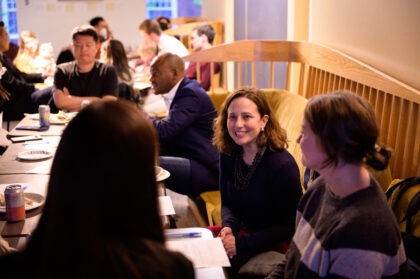In order to explore the ideas of Jurassic Park Rebirth, this post contains spoilers for the film. Jurassic World Rebirth, the latest film to spin out of Michael Crichton's novel Jurassic Park, opens with a flashback revealing experiments to create mutant species of dinosaurs which never existed. We are clearly meant to be unsettled, if not outright horrified, by this revelation even before it is underlined by the death of a scientist or technician at the claws of one such creature. (In what I hope is a nod to the … [Read more...] about Science Corner: Recombination is Creativity
Following Jesus Together on Campus
InterVarsity's Faculty Ministry is hosting a Summer Series providing weekly devotions and opportunities for spiritual direction and prayer. If you regularly receive the monthly newsletters Scholar's Journey or Campus Calling - you are already signed up and will receive weekly emails in July and August. If you don't receive those newsletters and would like to sign up, you can do so here: http://eepurl.com/jhA3R-/. _________________________________________________________________________________ Pilgrim … [Read more...] about Following Jesus Together on Campus
Science Corner: Of Barks & Bytes
Move over, Nintendo Switch 2--there's a new video game sheriff in town. Sure, the graphics are pretty rudimentary, and the controls are idiosyncratic. But how can you not be charmed by seals playing a video game--for science! Check out the link for a brief video clip. The "game" models features of a swim at various depths, and the seals interact in a way that indicates they understand what direction of travel is implied by the simulation. The results provide scientists insights into what cues seals use to navigate. … [Read more...] about Science Corner: Of Barks & Bytes
ESN Focus Groups – Sign Up and Share Your Ideas!
The Emerging Scholars Network wants to hear and learn from you! As we seek to live out the vision of developing scholars following Jesus together, we want to know what this looks like in today’s environment – both for scholars seeking an academic position and those looking to work outside the academy. How can ESN best support the ongoing formation of scholars as followers of Jesus and as thriving scholars, whether that’s online or on campus? Here's how you can help. Pray for fruitful conversations and wisdom … [Read more...] about ESN Focus Groups – Sign Up and Share Your Ideas!
Sharing the Scholar’s Journey
Summer Reading and Writing Group for Emerging Scholars This is what the Lord says: “Stand at the crossroads and look; ask for the ancient paths, ask where the good way is, and walk in it, and you will find rest for your souls.” - Jeremiah 6:16 Join other emerging scholars (grad students, post-docs, early career faculty) to walk in the good way this summer as we engage in community, spiritual formation, and faith/scholarship integration while on the scholars’ journey. discuss short readings share your own … [Read more...] about Sharing the Scholar’s Journey




